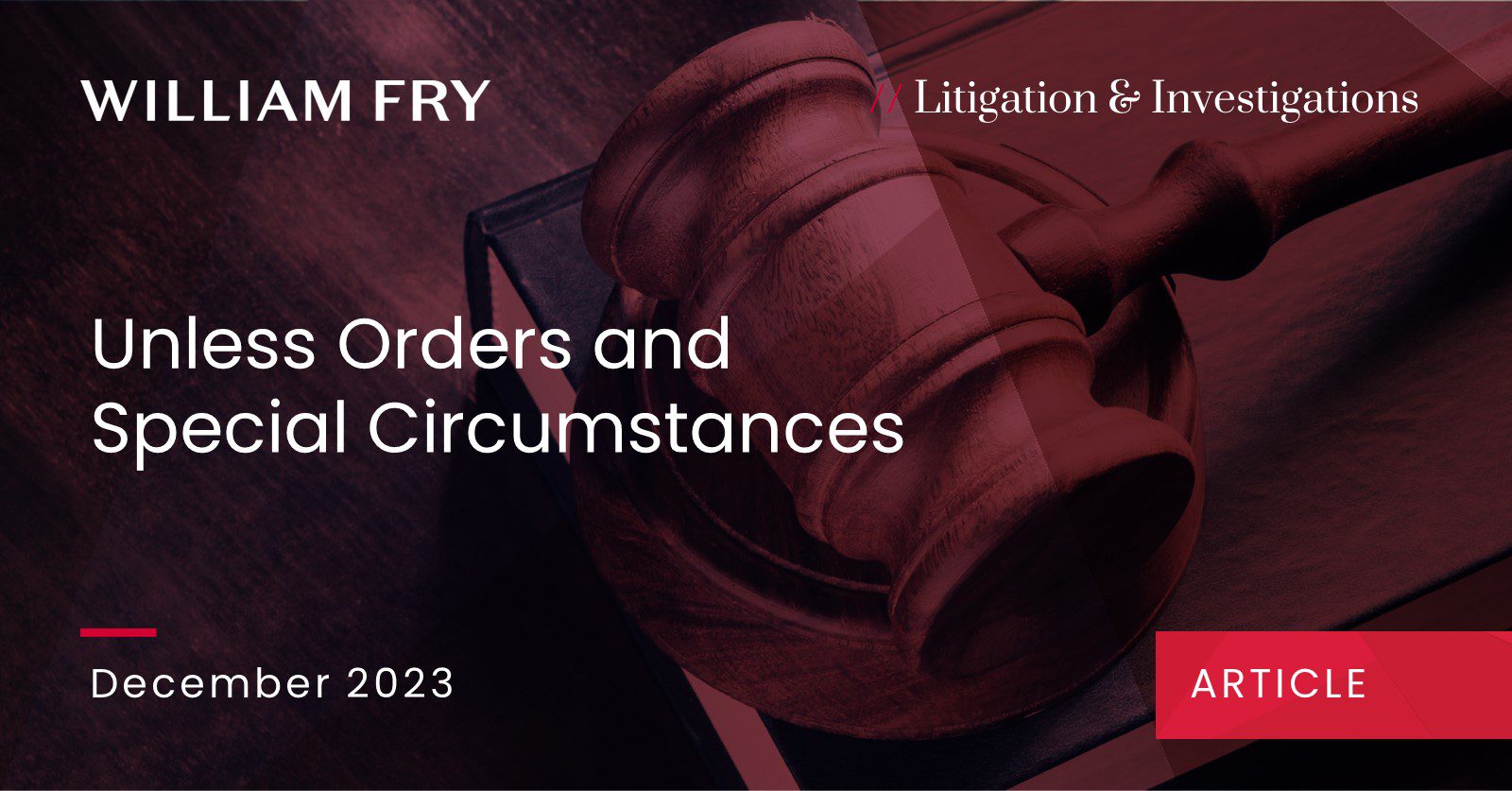In November 2021, changes to default judgment applications under the Rules of the Superior Courts (RSC) came into force.
Under the amended rules, judgment in default of defence, or judgment to dismiss the proceedings for failure to deliver a statement of claim, will be granted on the first return date, except where justice requires an extension of time. Where an extension is granted, the court will make an “Unless Order”. An Unless Order means that unless the statement of claim or defence is delivered within the extended period, the action will stand dismissed without any further application to the court.
Where judgment is obtained by default, it may be set aside if special circumstances exist. The High Court recently considered the application of such special circumstances.
Costern Unlimited Company v Fenton [2023] IEHC 552:
The plaintiff (Costern) brought a motion seeking judgment in default of defence against Ms Fenton. On 8 May 2023, an Unless Order was made on consent, which extended the time for the delivery of the defence by Ms Fenton and its filing in the Central Office to 5 June 2023. As 5 June 2023 was a bank holiday, the due date defaulted to the next working date, 6 June 2023. The impact of the Unless Order meant that if Ms Fenton did not deliver and file the defence by 6 June, Costern was entitled to judgment against her. The defence was not delivered or filed in accordance with the Unless Order. Consequently, Costern was entitled to enter judgment against Ms Fenton.
The defendant received the defence by email on 8 June 2023, and it was filed in the Central Office on 9 June 2023. On 20 June 2023, Costern served a notice of trial.
In early July 2023, Ms Fenton issued an application to extend the time to file her defence. That application was treated by the Court as an application to set aside the default judgment. Her main argument was that her solicitors placed the defence in the DX (document exchange) on Friday 2 June 2023, and believed (erroneously) that it would be delivered by the date provided in the Unless Order.
Special Circumstances
The Court referred to Order 27 Rule 15(2) of the RSC, under which an application to set aside a judgment by default will be allowed, where the court is satisfied that at the time of the default, special circumstances existed which explain and justify the failure.
In considering what constitutes special circumstances, the Court relied on the decision of Mr Justice Ferriter in De Souza v Liffey Meats [2023] IEHC 402 (De Souza), and summarised the relevant principles as follows:
- The question of special circumstances is to be treated not just at the date at when the order was made, but at the date of judgment by default; in effect when the Unless Order crystallises. This is because it is only when the judgment crystallises under the Unless Order that there is a “failure” to deliver.
- What amounts to special circumstances must be decided on the facts of a particular case. However, the test is “generally accepted [as being] a higher test than that of good reason”. In other words, some fact or circumstance “beyond the ordinary or the usual needs to be present”.
- The court must be satisfied that there are special circumstances before it considers justification issues such as prejudice and the interests of justice.
- Inadvertence or inattention on the part of a solicitor will rarely constitute special circumstances.
Decision
The Court found that the reasonable belief on the part of Ms Fenton’s solicitor that the defence had been delivered to the plaintiff’s solicitor through the DX, and in accordance with the terms of the Unless Order, amounted to special circumstances.
As regards the delay in filing the defence in the Central Office, the Court was not persuaded by Ms Fenton’s solicitor’s arguments of a lack of familiarity with the RSC. If that reason was offered on its own, it would not amount to special circumstances. However, the Court considered that Order 27 Rule 15(2) does not require it to be satisfied that special circumstances exist independently for the failure to deliver the defence and its filing in the Central Office. This was particularly so as the filing requirements are an administrative provision allowing the Central Office to deal with consequential applications on a default.
As to justification, the Court remarked that Ms Fenton moved quickly to set aside the default judgment, and the defence was received by the defendants in a matter of days after the date specified in the Unless Order. It followed that there was no specific prejudice in setting it aside.
Under the RSC, the court is required to recite the special circumstances in its Order. The Court sets aside the judgment on the basis that reasonable efforts were made to comply with the Unless Order and there was a reasonable belief by Ms Fenton’s solicitor that the defence would be so delivered.
Considerations
This decision further develops the principles set out in De Souza. As more applications come before the courts, the principles will continue to evolve. A key takeaway if an Unless Order is not complied with, is that the party in default should promptly move to set any consequent default judgment and must not delay in delivering the pleading.
If you have any questions regarding the above, judgments in default of defence or Unless Orders, please contact Hilary Rogers, Joanne Ryan or your usual William Fry contact.
Contributed by Gail Nohilly & Eilís Quinlivan



